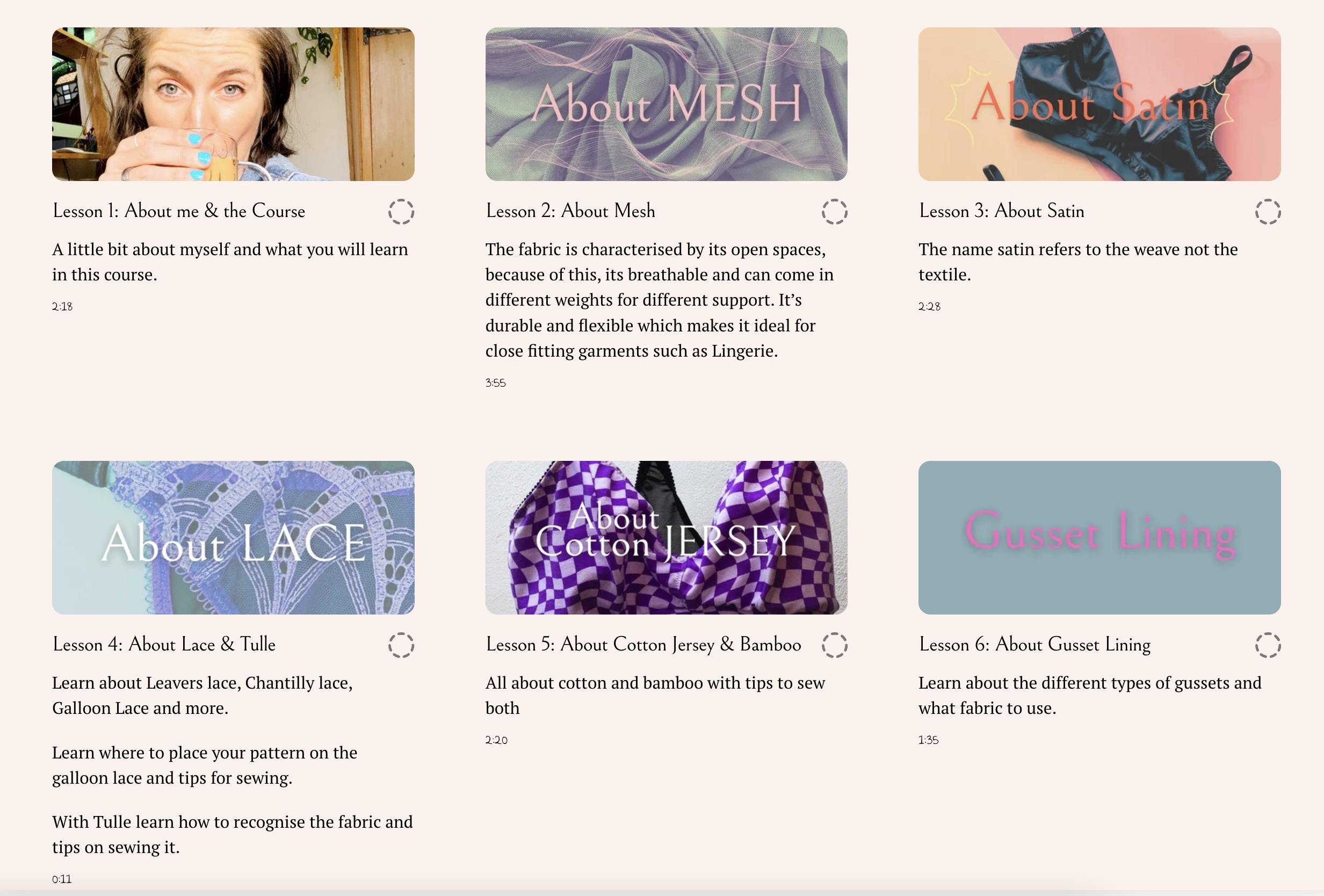Introducing: The fabrics & components section of How to design & refine your first lingerie collection, by clicking to join you will be asked to make an account, this allows you work through each section and have the ability to come back at any point.
Welcome to How to Design and Refine Your First Lingerie Collection, Fabrics are the foundation of every beautiful lingerie piece—but most designers don’t get taught how to truly understand them. Knowing how a fabric stretches and supports or holds up over time isn’t just technical knowledge—it’s what separates a good design from a great one.
When it comes to lingerie, fabric selection isn’t just important—it’s everything. The right lace, mesh, satin, or elastic can elevate a design and ensure it fits, feels, and functions exactly as intended. The wrong one? It can throw off the whole piece.
With endless fabric options out there, it’s easy to feel overwhelmed. This course is here to take away the confusion and give you confidence—whether you're just starting or looking to level up your knowledge.
This is your fabric foundation—taught simply, clearly, and specifically for lingerie designers.
A LOOK AT THE FIRST SIX VIDEOS
What’s inside the course?
Module 1: Master Fabric Selection
Gain the confidence to choose and sew the right materials for your lingerie designs. This module dives into essential lingerie fabrics—like lace, mesh, silk, and jersey—exploring their properties, uses, and how to handle them. You’ll learn how to select fabrics for style, comfort, and support, understand stretch and recovery, and get practical sewing tips tailored to delicate materials. By the end, you’ll be equipped to make informed fabric choices and communicate clearly with suppliers or manufacturers.
Module 2: Components & Elastics
Master the essential elements that bring your lingerie designs together. This module covers all the key components—like straps, rings, sliders, closures, underwires, and trims—explaining their purpose and how to choose the right ones for your style. By the end, you’ll be confident in sourcing and specifying every detail needed to bring your designs to life.
Module 3: Elastics
Unlock the secrets to choosing and sewing lingerie elastics with confidence. This module dives deep into key types—like knicker elastic, brushed-back, and fold-over elastic—teaching you how to identify stretch levels, calculate elastic lengths from patterns, and achieve a professional finish every time. You'll also learn time-saving techniques and machine settings to simplify the process. By the end, you'll know exactly how to apply elastics that feel comfortable, fit perfectly, and enhance the quality of your designs.
Who This Course is For
Aspiring Lingerie Designers:
Start building your material knowledge now so your future collections don’t just look beautiful—they feel and function beautifully, too.
Sewing Enthusiasts:
Ready to level up your skills? Learn how to confidently handle delicate, stretchy, and often tricky lingerie fabrics to get polished, professional-looking results.
Boutique Brand Founders:
If you're launching your own lingerie brand, understanding your materials is a game-changer. You’ll learn how to choose fabrics and findings that elevate your designs and make your brand stand out.
Fashion Students:
I remember being exactly where you are! This course gives you insider knowledge that goes beyond textbooks—perfect for developing your portfolio and gaining confidence in lingerie construction.
Stop second-guessing your fabric choices and start creating beautiful, high-quality lingerie with clarity and confidence.
What’s Next?
By the end of the course, you’ll have a clear understanding of which fabrics and components you need for your designs—and now it’s time to gather them.
To make this easy, I’ve included a BOM (Bill of Materials) template—the very same format used in professional tech packs across the lingerie industry. Think of it as your ultimate shopping list for each design.
Whether you’re planning to sew it yourself or send it to a factory, the BOM helps you stay organised, clear, and ready to move forward. And if you’re aiming to launch your own lingerie brand, this habit of documenting your materials now will serve you well down the line.
It might sound technical, but don’t worry—it’s simply a list of what you need to bring your design to life. Start as you mean to go on: organised, confident, and industry-ready.



